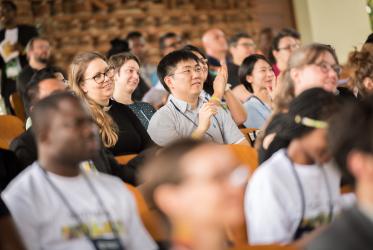In 2018 we celebrate the 70th anniversary of the World Council of Churches. In order to create a lively firsthand account of the ecumenical fellowship and of our shared journey, member churches have contributed stories of people, events, achievements and even failures, all of which have deepened our collective search for Christian unity.
This story was written by Melanio L. Aoanan, who was the fifth president at Southern Christian College, Midsayap, Cotabato, Philippines (2007-2010). He is now program director, Master of Arts in Theology at Brokenshire College, Davao City. He was also a faculty member in three Protestant seminaries and two Roman Catholic post-graduate schools of theology in the Philippines.
Any views or opinions expressed in this article are those of the author, and do not necessarily reflect the policies of the World Council of Churches.
A combination of wit, sense of humor and humility and the capacity for openness to new ideas combined with hard work are the sure formula for successful and effective church leaders.
Let me stress that every Christian believer in the twenty-first century, whether you are an Anglican or Alliance, Baptist or Methodist, Roman Catholic or United Church of Christ in the Philippines, has a calling to promote the unity of the church. This is what Christ had fervently prayed for. “I pray not only for them, but also for those who will believe in me through their word, so that they may all be one… that the world may believe…” (John 17:20-21).
Every follower of Christ must show a kind of enthusiasm in advocating for the visible unity of the church. Whether as individual believers or as a community, it is our collective task to advocate for Christian unity. We must all be engaged actively in what I call “the ecumenical enterprise.”
The ecumenical enterprise in which all Christians must engage in requires a conversion to the will of Christ for the church. The start of the 21st century was a jubilee not only for the church but also for the wider human community. And as such, we who are pastors and theological educators are challenged to live out God’s purposes in all aspects of our task. This is our commitment to contribute meaningfully to the realization of God’s reign that ushers in the transformation of church and society, i.e., the bringing about of God’s reign characterized by peace, justice, freedom and abundant life for all.
We are part of the church as community of God’s people called out of darkness into God’s marvelous light that you must tell all the wonderful things that God has done (I Peter 2:9).
What is the ecumenical movement?
After emphasizing the vocation of promoting visible Christian unity, we must provide an initial definition of the ecumenical movement. First, the ecumenical movement is not so much an organization, but rather more of a process. There are two phases in the understanding of this process. In the first phase, the ecumenical movement is understood to be an organized ecclesiastical effort among Protestant, Anglican, and Orthodox churches toward church unity. This organized effort was institutionally manifested in the formation of the World Council of Churches (WCC) in 1948.
Beginning with the Second Vatican Council (1962-1965), however, the second phase of the process, the Roman Catholic Church has increasingly believed and participated actively in the work of the ecumenical movement. Significant points of convergence have been realized between the two ecclesiastical entities, so much so that the Roman Catholic Church could become a member church of the WCC in the near future.
It must be emphasized, however, that the ecumenical movement should not be equated with the WCC even if it includes the Roman Catholic Church into its membership. There are other organizational manifestations of the ecumenical movement.
Two pioneering works on ecumenism
In the 1950s and 1960s, two publications gave birth to the study of ecumenism. The first is “Christian Theology: An Ecumenical Approach” (first published in 1955 then revised and expanded in 1958) authored by Walter N. Horton. The other, “Ecumenics: The Science of the Church Universal” by John A. Mackay was published in 1964. Both books were nourished from the bosom of the ecumenical movement. Horton and Mackay were the pioneers who led the intellectual, theological and organizational life of the ecumenical movement. Let me describe briefly the important ecumenical insights derived from them.
Horton’s book deals with the “seven fundamental doctrines” such as: the knowledge of God; the nature of God; God and the world; God and the human; Christ the Savior; the church and the means of grace; and the Christian hope. As an ecumenical approach to theology, the book examines the reports of ecumenical conferences so as to determine the emerging agreements within the ecumenical movement. The book provides clarification about “the basic concern of an ecumenical approach to theology”.
The basic concern of ecumenical theology has gradually emerged from the discussions among the Christian churches as they mutually seek to actualize the Lord’s “other prayer,” that is, “that they all may be one” (John 17:21). Horton answers the basic theological question that undergirds this search for Christian unity. He asserts that the quest for Christian unity should have the following principles. First, it should have a missionary character. Second, it should be truly worldwide in scope. Third, it should combine ‘catholic’ unanimity with ‘protestant’ liberty and variety. Combining these three principles into one gives a definition of the basic concern of ecumenical theology.
Another significant and pioneering book on the ecumenical movement is that of John Mackay. This book deals primarily with the doctrine of the church or ecclesiology. Mackay can be credited as the father of the science of ecumenics because he initiated the establishment of this theological discipline in 1937 at Princeton Theological Seminary. In fact, in a festschrift honoring his retirement in 1959, Richard Shaull writes: “For [Mackay], Ecumenics transforms the study of missions in the seminary into a theological discipline. It comes to occupy a central place in theological education because it keeps constantly before the seminary the calling of the church to mission in the world and reminds us all that... ‘theology and theologians and theological seminaries must, therefore, be missionary.’ ”
Through this book, Mackay presented his unique personal experiences in and profound reflections on the ecumenical movement. This book was his initial attempt towards an ecumenical theology which focuses on the doctrine of the church. He deals with the church thoroughly and exhaustively—its nature and functions—in the context of a world missionary community. He was the first to call our attention to the renewed interest in the church during our time. This interest was reflected in the 1937 Oxford Conference on Life and Work. It was this gathering that popularized the slogan “Let the Church be the Church” as well as made the term “ecumenical” restored to its current usage.
The renewed interest in the church—brought about by sound biblical theology, the unparalleled expansion of the faith, and the desire to achieve oneness among Christians for the sake of their mission in the world—demands a special and separate theological discipline which is ecumenics. Mackay describes ecumenics as the study of “Christian churches within the context of God’s purpose declared in the Bible, and the human situation as it is today, with a view to the development of a Christian strategy worthy of the mandate of Jesus Christ to bring all nations to His allegiance, and receptive to the infinite resources made available by God to Christ’s followers through the Holy Spirit.”
Thus, the subject matter of ecumenics is the church universal—the church as an empirical fact and as a “spiritual reality.” The church as an empirical fact refers to a physical structure, a local congregation, a Christian tradition, and an ecclesiastical hierarchy. The church as a spiritual reality refers to “a reality corporate in nature and worldwide in its dimensions.” More than this, Mackay points out that there are three requirements for the church if it is “to be in very deed” the church.
First, it is a community of Christ, that is, “the fellowship of all those for whom Jesus Christ is Lord.” Second, it is a worldwide community, that is, “it is global in its geographical extension, and all embracing in its human inclusiveness.” Third, it is a missionary community. This means that the church “is to live in the frontiers of life in every society and every age.” This demand is made to all Christians “to make the Gospel known to all nations and live the Gospel in every sphere and phase of their earthly life.”
Bible as the motivating force in educating church leaders
One significant factor in the rise of the modern ecumenical movement is the emphasis on biblical scholarship. Therefore, as members of the ecumenical stream of Christianity in our country, our motive force in the search for a life-giving ecumenical theology is none other than the Bible.
Our cry and struggle with our people is for life. As we involve ourselves in the people’s struggle for life, we experience God’s empowering Spirit, inspiring, comforting, sustaining with inner strength our actions to preserve and pursue justice and peace. People saying NO to forces and systems that try to diminish their humanity and their assertion of their rights as human beings are steady signs of God’s redemptive activity in the Spirit.
Our quest for life is a quest for God’s reign as envisioned and inaugurated by Jesus. We believe that our struggles will bring God’s reign closer to reality. In the struggle, we experience a deep and enduring sense of satisfaction and encouragement as we stand in solidarity with our sisters and brothers. As our participation in the struggle bears fruit, we experience joy and fulfillment. By identifying ourselves with the suffering, we enter into the cycle of life where the cross preludes the resurrection and the resurrection draws us more into the wellspring of life to enable us to bear the cross when it comes again. This way we get a glimpse of the new life that is to come, we are given a foretaste of God’s reign.
Concluding statement
I am convinced that we need to have a clear vision towards educating Church leaders that is relevant in the 21st century. This means that as a community of faith and learning, we need to relate our theologizing, our articulation of ecclesiology, and the praxis of our ministry to the concrete cultural expressions prevailing in our local consciousness and imaginations. I suggest that our theme requires of us to formulate a vision for religious and ecumenical theological education that is appropriate for our context in the 21st century. This vision, I suggest, must strive for the following. First is to strive for clarity of theological foundations for the life and work of the church. Second is to strive for sensitivity and awareness of the realities that impinges deeply upon the life of people in church and community. Third is to strive for the identification of essential needs and thereby establishes priorities. Fourth is to keep the spirit aflame in unity and collegiality among those who must work in solidarity with the victims and the marginalized in our society.
Educating pastors for ecumenical leadership in the 21st century must explore the discussion on emerging ecumenical consensus on doctrinal and theological issues and in bringing deeper awareness to the emerging contextual spirituality.
Meanwhile, as our struggle continues, we eagerly anticipate the fullness of God’s reign and intensify our commitment for its realization (“May your kingdom come on earth as it is in heaven”). We will not settle for less than the glorious reign of God. In accordance with God’s promise, we wait for new heavens and a new earth, where justice dwells.
More information about 70 years of the WCC
Read more WCC 70th anniversary stories
If you feel inspired to send us your WCC story, too, please be in touch!







